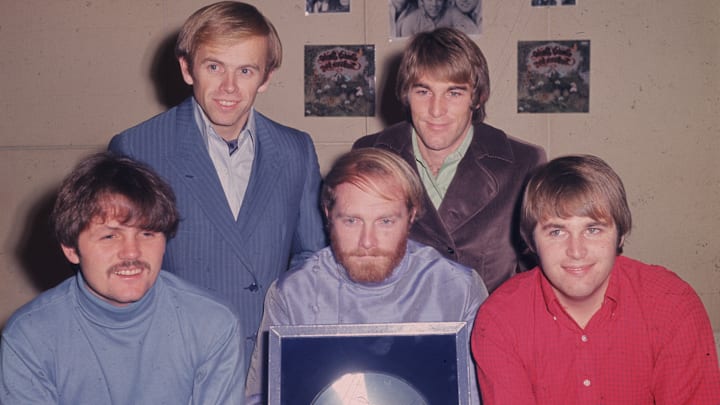We're living in an increasingly singles-driven market thanks to streaming playlists and platforms like TikTok. In many ways, we've reverted back to the 1950s model, where albums were compilations of filler songs with a few big singles. That said, the album is still viewed by many as the true marker of musical artistry.
A classic album is a necessary calling card to be considered a great artist, and there are numerous stories about albums that changed artists' lives that were nearly scrapped, or made under the stress of record label expectations. The success stories are fun, but we're here to discuss the albums that never quite made it across the finish line.
The ones that did get scrapped, and would have altered the course of their artists' careers had they actually seen the light of day. For better, or for worse. Albums are being scrapped every other day, but these are the ones we felt were the most notable in terms of what "could have been."
Human Highway (1973) - Crosby, Stills, Nash & Young

Human Highway was meant to be a comeback after Crosby, Stills, Nash & Young spent the first half of the decade putting out solo material. Nash even snapped a photo of the four mercurial members on a beach. Unsurprisingly, egos, drugs and debates over which songs made the album led to it being scrapped, and songs being scattered amongst subsequent solo releases.
Crosby, Stills & Nash had a triumphant comeback with their self-titled (and Young-less) album in 1977, but they'd already aged out of their prime by then. Human Highway could have been another folk rock classic, solidifying their classic lineup and perhaps even resulting in more CSNY material.
Household Objects (1974) - Pink Floyd

Pink Floyd were riding high off the success of Dark Side of the Moon (1973), and they were a bit freaked out by it. The band wanted to ensure that they maintained their experimental edge, and as such, announce plans to release Household Objects, an album completely made up of sounds from, you guessed it, household objects.
The band decided to axe this idea in favor of the more traditional (by Floyd standards, at least) Wish You Were Here (1975), which is now considered by many to be a classic. It would've been fascinating to see the band follow up their commercial breakthrough with a Tusk-esque oddity, but the decision they made was probably the right one.
Lifehouse (1971) - The Who

We talked about this one briefly on our list of classic albums that were originally supposed to be double albums, but Lifehouse is such a notable non-release than it warrants inclusion here. The Who intended to release another sprawling rock opera in the vein of Tommy (1969), but it was decided that it would behove them to release something shorter and more straightforward.
They were right. Who's Next (1971) was the album that was born out of the Lifehouse sessions, and it remains the band's defining release. It's fun to envision how the Who would be perceived today if they had gone with their initial plan, but we're ultimately glad they didn't.
Get Back (1969) - The Beatles

The Beatles tried and failed to get back to their roots with their planned 1969 album. The sessions ultimately fell through, despite producing a few hit singles, and the whole thing was repurposed as Let It Be a year later (the Disney Plus documentary series details these sessions).
It would have been exciting to hear the Beatles revisit the music of their youth via covers, and artwork that referenced their debut, Please Please Me (1963), but fans were gifted Abbey Road (1969) and the aforementioned Let It Be instead. It would not have been worth the trade off.
Electric Nebraska (1982) - Bruce Springsteen

An interesting case of an album that was technically released. Bruce Springsteen recorded the demos for Nebraska, with the intention of rerecording them with the E Street Band, but he was so struck by the sound of the demos that he decided to put them out as is. Consequently, the eletric version of the album was scrapped.
Nebraska remains, for many, Springsteen's finest hour. This is largely due to its sparse and stripped down production. An electric version may have sapped that intimacy, and as a result, damaged its singular reputation in the Boss' catalog.
Black Gold (1970) - Jimi Hendrix

Jimi Hendrix was coming off his staggering three album run with the Jimi Hendrix Experience when he recorded the songs that were meant to comprise Black Gold. The album is alleged to have run a lengthy 16 songs, and dabble in genres such as funk and jazz.
Unfortunately, Hendrix died before Black Gold could be properly compiled, and it was never properly compiled and/or released. There are proposed track lists floating around the internet, and songs that have leaked, but we will likely never get to hear the guitarist's true vision. A posthumous classic would not have done much for Hendrix's career, but it would have further solidified his genius status.
Smile (1967) - The Beach Boys

The holy grail of unreleased albums. The Beach Boys were making a case to be the most inventive band in the world by 1967, thanks to their seminal single "Good Vibrations." Sadly, band turmoil, and the dwindling mental health of leader Brian Wilson led to the single's accompanying album, Smile, being placed on the shelf.
Smile has been released in various forms over the years, but it's difficult to assess how important its release would have been in 1967, and how it would have reshaped the rest of the band's career. It is the most consequential unreleased album in rock history, and based on what we've heard, it would have been Wilson's magnum opus.
